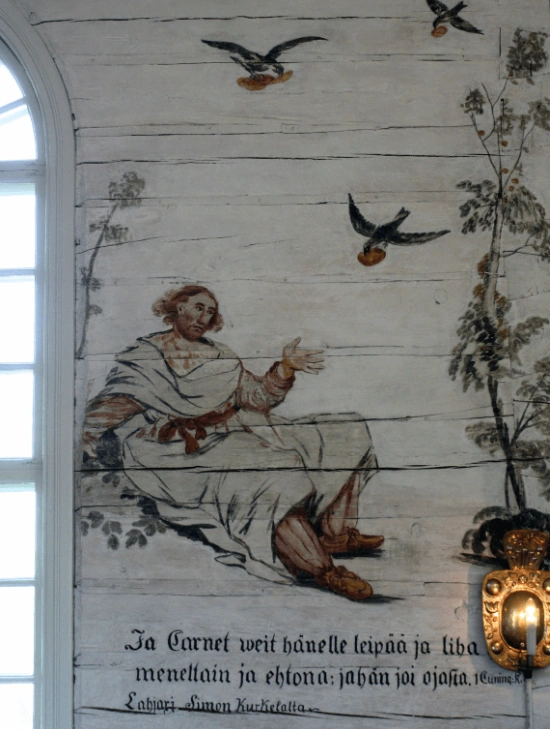1673. And smote the Rephaim in Ashteroth-karnaim, and the Zuzim in Ham, and the Emim in Shaveh-kiriathaim. That this signifies the persuasions of falsity, or the hells of such, which the Lord conquered, is evident from the signification of “the Rephaim,” “the Zuzim,” and “the Emim,” as being of similar kind with “the Nephilim,” who are mentioned in Genesis 6:4; and in the exposition of that passage (see n. 581) it was sufficiently and abundantly shown that by “the Nephilim” are signified persuasions of falsity, or those who from a persuasion of their own exaltation and preeminence have made nothing of all holy and true things, and who have infused falsities into their cupidities; as is also plain from the passages there adduced (Numbers 13:33; Deuteronomy 2:10-11 Isaiah 14:9; 26:14, 19; Psalms 88:10). The different kinds of persuasions of falsity are what are here signified by these three and by “the Horites in Mount Seir;” for there are many kinds of persuasions of falsity, not only according to the falsities, but also according to the cupidities to which they are adjoined, or into which they are infused, or from which they flow forth and are produced. The nature of these persuasions of falsity can never appear to any man, who scarcely knows more than that there is such a thing as persuasion of falsity and cupidity of evil; but in the other life they are most distinctly arranged into their genera and into their species.
[2] The most direful persuasions of falsity existed with those who lived before the flood, especially with those who were called “Nephilim.” These Nephilim are of such a character that in the other life they by their persuasions take away from the spirits to whom they come all faculty of thinking, so that these spirits seem to themselves scarcely to live, much less to be able to think anything true. For, as before shown, there is in the other life a communication of the thoughts of all, and therefore when such a persuasiveness flows in, it cannot do otherwise than as it were murder all power of thought in others. Such were the wicked tribes against whom the Lord combated in His earliest childhood, and whom He conquered; and unless the Lord had conquered them by His coming into the world, not a man would have been left at this day upon the earth; for every man is governed by the Lord through spirits. These same Nephilim are at this day enclosed by their phantasies by what seems like a misty rock, out of which they are continually striving, but in vain, to rise up (concerning whom see n. 1265, and in many other places above). These, and others like them, were also meant in Isaiah:
The dead shall not live, the Rephaim shall not rise, because Thou hast visited and hast destroyed them, and hast made all their memory to perish (Isaiah 26:14).
[3] Also in David:
Wilt Thou show a wonder to the dead? shall the Rephaim arise and praise Thee? (Psalms 88:10),
where by “the dead” are not meant the dead, but the damned. There are also those at this day, especially from the Christian world, who likewise have persuasions, but not so direful as the antediluvians had. There are certain persuasions of falsity which take possession of both the will part and the intellectual part of man; such were those of the antediluvians, and of those who are here signified by the Rephaim, the Zuzim, and the Emim. But there are other persuasions of falsity which take possession of the intellectual part only, and which arise from the principles of falsity that are confirmed in one’s self. These are not so powerful, nor so deadly, as the former; but still they cause much annoyance to spirits in the other life, and take away in part their ability to think. Spirits of this kind excite in a man nothing but confirmations of what is false, so that the man sees no otherwise than that falsity is truth, and evil good. It is their sphere which is of such a character. As soon as anything of truth is called forth by angels, they suffocate and extinguish it.
[4] A man can perceive whether he is governed by such as these simply by observing whether he thinks the truths of the Word to be false, and confirms himself so that he cannot see otherwise; if such be the case, he may be pretty sure that such spirits are with him, and that they have the dominion. In like manner they who persuade themselves that their private advantage is the common good, and who regard nothing as being for the common good but what is also to their own advantage; in this case also the evil spirits who are present suggest so many things in confirmation that they see no otherwise. They who are such that they regard every advantage to themselves as the common good, or who veil it over with the appearance of being the common good, do much the same in the other life in regard to the common good there. That such is the nature of the influx of spirits with man, it has been given me to know by continual experience to the life.







